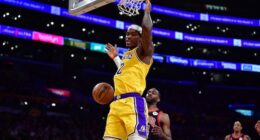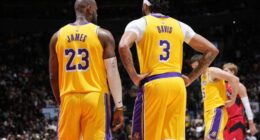
In the NBA, the term is altered drastically.
If I had to pinpoint what legacy means in sports, it is how one performs when the spotlight shines the brightest. In essence, how fans will remember how their heroes performed in the biggest games.
For example, as a certain ESPN columnist from Boston always enjoys pointing out the fact that Kobe Bryant shot 6-24 in Game 7 of the 2010 Finals, which they see as a demerit when discussing #24’s legacy.
But for me, the only statistic that mattered on the night of June 17tth, 2010 was that the Los Angeles Lakers won 83-79 and were crowned champions for the 16th time in franchise history.
It doesn’t matter how you win, it’s about winning. In basketball, politics and war, at the end of the day, people will remember the result before they remember how you won or lost.
After the 2011 flameout to the Dallas Mavericks in the Western Conference Semi-Finals, Kobe said “losing is losing. There are different degrees of it but the result is the same.”
Take the incredible finals between the Heat and the Spurs we just witnessed.
In Game 7 Chris Bosh had more fouls (5) than points (0). In the same game, Tim Duncan, the greatest power forward of all-time, missed in his words “a bunny” that could have tied the game with 39 seconds to go in the fourth. Throughout the first five games, Danny Green was out-shooting the most decorated three point shooter of all-time, Ray Allen, but Jesus Shuttlesworth canned the three that mattered the most at the end of regulation in Game 6.
Will any three of those situations affect how we perceive Bosh, Duncan, Green or Allen as players moving forward? Unlikely, as in a couple months they’ll have another shot to re-mold their legacy.
Do you remember what Ron Artest’s stat line was in Game 7 of 2010? Well he was the second leading scorer of the Lakers that night with 20 points, and took six fewer shots than Kobe to get there.
But what does that mean? Three years removed from that fateful night, Ron Artest has become Metta World Peace and a punchline for Jimmy Kimmel’s post-game comedy shtick, while at the same time we still discuss Kobe’s name with such reverence, despite the 6-24.
It’s about continuing to produce results, and not overvaluing how a player performs in a certain situation. That’s why it bothered me so much to hear people tweet about the consequences of certain players’ legacies left, right and center as the San Antonio, Miami series came to a close.
Robert Horry’s legacy is that of a clutch player because he hit big shots over and over, not because he had one good game during one playoff run.
We’d like to think that legacy matters to the players, but it doesn’t. Legacy is more for us fans. Legacy is a talking point.
We’d like to believe the players care as much about the results as us fans do but that’s not always the case, unless we’re talking about Kobe, it’s a job for them. My favorite scene from Jimmy Fallon’s Fever Pitch was when Fallon’s character and his buddies walked into a bar extremely depressed after the New York Yankees took a 3-0 series lead on his Red Sox, only to find several members of his beloved Sox having a couple drinks and having a jolly good time despite the result.
A reporter asked Gregg Popovich about the legacy he’s left with the San Antonio Spurs franchise. He just scoffed at the question before answering “food and wine. It’s just a job.”
And that’s exactly it. If legacy mattered so much, explain how the Golden State Warriors took it to the Spurs in the second round with no fear whatsoever despite the fact that Tim Duncan had more NBA championship rings (4) than the entire Warriors team combined (0).
It’s a game of basketball and forever will be.
The players play it because they love the game more than we can imagine. Us fans watch because we can only dream about the athletic feats they make look mundane on television. That’s it. Legacy has nothing to do with the enjoyment level of the fans or the players; while ‘momentum’ is just as subjective, it’s much more measurable than ‘legacy’ (as demonstrated when the Purple and Gold went on a 20-0 run in the fourth to stage an improbable comeback versus the New Orleans Hornets back in March).
The decision Dwight Howard will make come July 1st in terms of free agency will most definitely shape his legacy and how the media and the fans perceive him. But deep down, Howard just wants an opportunity to play with a supporting cast who can optimize his skill set while giving him the best shot at a championship, which is why Houston is such an attractive option for Dwight.
Come to think of it though, without us fans to care, dissect and psycho-analyze, what would professional sports be? So perhaps the term legacy does hold more water than I thought.
Time to re-consider everything I just wrote.
—————————————————————————————————————–
Did you see our video about Phil Jackson acting as a Lakers consultant? If not, check out our video below and don’t forget to click here to subscribe to our YouTube Channel!





